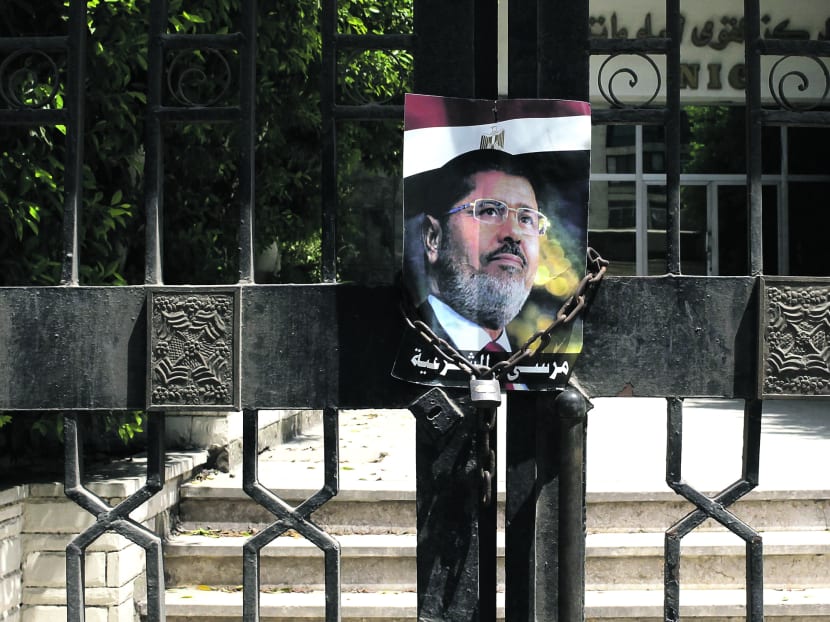Egypt deadlocked as groups call for protests
CAIRO — Egypt’s new leadership wrangled over the naming of a Prime Minister yesterday as both the Muslim Brotherhood and its opponents called for new mass rallies, renewing fears of another round of street violence over the military’s ousting of former Islamist President Mohamed Morsi.

A picture of deposed President Mohamed Morsi outside the gates of a government building in Cairo, Egypt, yesterday. Photo: Reuters
CAIRO — Egypt’s new leadership wrangled over the naming of a Prime Minister yesterday as both the Muslim Brotherhood and its opponents called for new mass rallies, renewing fears of another round of street violence over the military’s ousting of former Islamist President Mohamed Morsi.
The calls for competing rallies came after clashes three days ago between the rival camps left at least 36 dead and more than 1,000 injured nationwide.
The military said troops had been deployed to forestall new violence between pro- and anti-Morsi factions and warned against any “provocative actions”. In the violence on Friday, it had sided with the anti-Morsi crowds and, in one case, opened fire on pro-Morsi demonstrators.
United States President Barack Obama on Saturday condemned the violence and said Washington was not working with any particular party or group in Egypt.
The Brotherhood, which helped propel Mr Morsi to power as Egypt’s first democratically elected leader, has denounced the military’s move and called for protests until he is re-instated. Mr Morsi has been detained by the military, though his location is unknown.
In a Facebook posting yesterday, the Brotherhood’s supreme leader Mohammed Badie said the “leaders of the unconstitutional coup” were continuing “flagrant violations against the Egyptian people”.
Since Mr Morsi’s removal on Wednesday, several of the Brotherhood’s top figures have been detained, including Mr Badie’s deputy Khairat El Shater, seen as the most powerful figure in the group and its main decision-maker.
Meanwhile, the collection of liberal, secular and youth groups that spearheaded the campaign to oust Mr Morsi called for a mass rally of their own yesterday in Cairo’s Tahrir Square to defend the country’s new, military-backed interim leadership.
Last week, millions of Egyptians nationwide participated in four days of mass protests demanding Mr Morsi be removed, angered by what they saw as the domination of the Brotherhood and Mr Morsi’s failures to address worsening economic woes.
When the military ousted Mr Morsi, it suspended the Islamist-drafted Constitution and installed senior judge Adly Mansour as interim President to lead the Arab world’s most populous nation.
In the interim period — whose length remains unknown — the Prime Minister would have sweeping powers to govern, while the President is expected to be a largely symbolic post.
But divisions were stalling the naming of a Prime Minister and creation of a new Cabinet. Mr Mansour’s office on Saturday backtracked on a decision to appoint pro-reform leader Mohamed ElBaradei as Prime Minister after an Islamist party — the ultra-conservative Salafi Al Nour — objected.
Mr ElBaradei, a Nobel Peace laureate for his time as head of the United Nations nuclear watchdog, is an inspiring figure among the leftists, secular and revolutionary youth groups behind the 2011 uprising that toppled autocrat Hosni Mubarak but is deeply distrusted as too secular among many Islamists. Agencies






